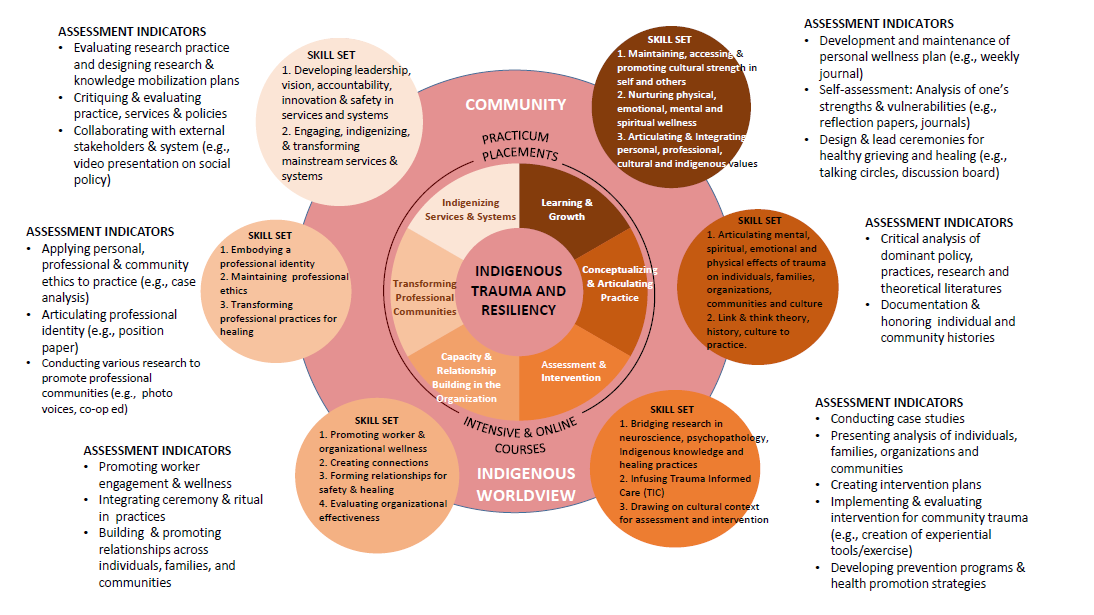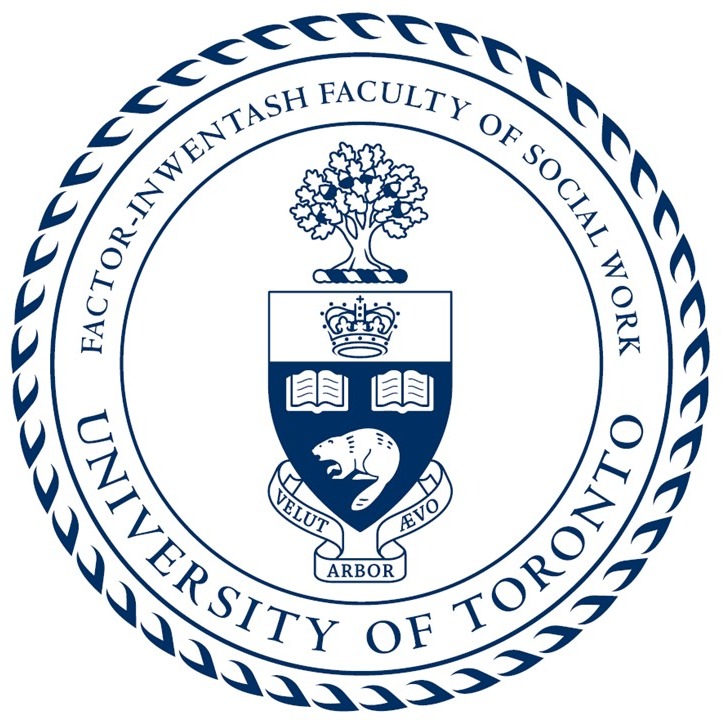MSW – Indigenous Trauma and Resiliency

The foundations for the MSW-ITR field of study are values of respect, honesty, kindness, humility, cooperation and belonging held by the Indigenous people of Turtle Island. The curriculum invites learners of all indigenous origins to identify and explore their ancestry, learning how to build on inherent knowledge and wisdom to inform their social work practice. Each learner will bring their gifts of humanity and healing to the program and learn how to integrate them with the wisdom of an Indigenous worldview, the latest neuroscience, knowledge of trauma and resiliency, and social work practice and ethics to contribute to a collective understanding of how to serve individuals, families, and communities in the global context.
The MSW-ITR came from the vision of seven Indigenous women: Jane MiddeltonMoz, Rebecca Martell, Sylvia Maracle, Kim Anderson, Suzy Goodleaf, JoAnn Kauffman and Maria Campbell. They had a dream of how community can change if trauma and healing practices were approached from a culture-based and community-driven lens. In the spring of 2011, the OFIFC and the Middelton-Moz Institute invited leaders in the fields of trauma, education, Indigenous spirituality, healing and leadership, and community intervention to form the Governing Council to envision the MSW-ITR Field of Study. The current MSW-ITR Governing Council includes: Jane Middelton-Moz, Sylvia Maracle, Suzy Goodleaf, and JoAnn Kauffman.
Core faculty
ITR Program Coordinator
Faculty Coordinator
The MSW-ITR Partners
This field of study was launched in 2016 in partnership between the Ontario Federation of Indigenous Friendship Centres (OFIFC), the Middelton-Moz Institute, and the FactorInwentash Faculty of Social Work (FIFSW), University of Toronto.
Ontario Federation of Indigenous Friendship Centres (OFIFC)
Founded in 1971, the Ontario Federation of Indigenous Friendship Centres (OFIFC) works to support, advocate for, and build the capacity of member Friendship Centres across Ontario. Emerging from a nation-wide, grass-roots movement dating back to the 1950’s, Friendship Centres are community hubs where Indigenous people living in towns, cities, and urban centres can access culturally based and culturally appropriate programs and services every day. Today, Friendship Centres are dynamic hubs of economic and social convergence that create space for Indigenous communities to thrive. Friendship Centres are idea incubators for young Indigenous people attaining their education and employment goals, they are sites of cultural resurgence for Indigenous families who want to raise their children to be proud of who they are, and they are safe havens for Indigenous community members requiring supports.
In Ontario, 88% percent of Indigenous people live in urban communities. The OFIFC is the largest urban Indigenous service network in the province supporting this vibrant, diverse, and quickly growing population through programs and initiatives that span justice, health, family support, long-term care, healing and wellness, employment and training, education, research, and more.
Friendship Centres receive their mandate from their communities, and they are inclusive of all Indigenous people – First Nation, Status/Non-Status, Métis, Inuit, and those who self-identify as Indigenous from Turtle Island.
Visit the OFIFC website in order to learn more about OFIFC and the Friendship Centre Movement in Ontario.The Master of Social Work, Indigenous Trauma and Resiliency (ITR) field of study emphasizes and focuses on the strong connection between personal, cultural, professional, and academic development. Students will develop self-awareness and personal skills to become effective and competent professionals by studying the history of trauma in their own family, community, racial, and cultural group. They will also discern individual resiliency through values, ceremonies and teachings of their cultural heritage.
Middelton-Moz Institute
The Middelton-Moz Institute addresses the effects of current, cumulative, generational, and historical cultural trauma with individuals, families and communities. With 50 years of experience as a clinician and author, Jane Middelton-Moz has turned her focus in recent years to delivering community intervention as it is proving to be the most effective for working with people and communities struggling with tremendous grief and loss, suicides, sexual and physical abuse, abandonment and neglect, lateral violence, cumulative impacts of historical and generational trauma, and high drop out rates. She focuses on strength-based approaches to trauma-informed work in schools and communities and increasing recognition of resiliency.
Visit the Middelton-Moz Institute website for more information.
The Factor-Inwentash Faculty of Social Work (FIFSW)
FIFSW at the University of Toronto was established in 1914 and is Canada’s oldest school of social work. Distinguished by its commitment to academic and practice excellence, FIFSW is the top-ranked school of social work in Canada and one of the top two in the world. It is distinguished by its emphasis on the integration of research, theory and practice in both the classroom and practicum education, providing students with the knowledge and skills to work effectively with others in a complex and ever-changing world. FIFSW offers professional and academic programs of study, with a fully accredited Master of Social Work program and a Doctor of Philosophy program focusing on social work research, education and policy.
Indigenous trauma and resiliency competence infographic:

